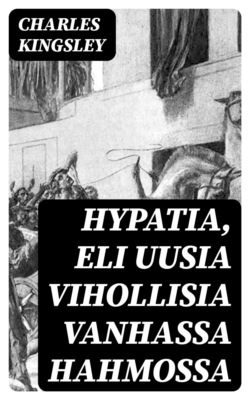Kitabı oxu: «All Saints' Day and Other Sermons»
“Inheriting the zeal
And from the sanctity of elder times
Not deviating;—a priest, the like of whom
If multiplied, and in their stations set,
Would o’er the bosom of a joyful land
Spread true religion, and her genuine fruits.”
The excursion—Book vi.
PREFATORY NOTE 1
The following Sermons could not be arranged according to any proper sequence. Those, however, which refer to doctrine and the Church Seasons will mostly be found at the beginning of the volume, whilst those which deal with practical subjects are placed at the close.
A few of the Sermons have already appeared in “Good Words;” but by far the greater number were never prepared by their author for the press. They were written out very roughly—sometimes at an hour’s notice, as occasion demanded—and were only intended for delivery from the pulpit.
The original MSS. have been adhered to as closely as possible.
It is thought that many to whom the late Rector of Eversley was dear will welcome the publication of these earnest words, and find them helpful in the Christian life.
“Blessed are the dead which die in the Lord from henceforth: Yea, saith the Spirit, that they may rest from their labours; and their works do follow them.”
SERMON I. ALL SAINTS’ DAY
Westminster Abbey. November 1, 1874.
Revelation vii. 9-12. “After this I beheld, and, lo, a great multitude, which no man could number, of all nations, and kindreds, and people, and tongues, stood before the throne, and before the Lamb, clothed with white robes, and palms in their hands; and cried with a loud voice, saying, Salvation to our God which sitteth upon the throne, and unto the Lamb. And all the angels stood round about the throne, and about the elders and the four beasts, and fell before the throne on their faces, and worshipped God, saying, Amen: Blessing, and glory, and wisdom, and thanksgiving, and honour, and power, and might, be unto our God for ever and ever. Amen.”
To-day is All Saints’ Day. On this day we commemorate—and, as far as our dull minds will let us, contemplate—the saints; the holy ones of God; the pure and the triumphant—be they who they may, or whence they may, or where they may. We are not bidden to define and limit their number. We are expressly told that they are a great multitude, which no man could number, of all nations, and kindreds, and peoples, and tongues; and most blessed news that is for all who love God and man. We are not told, again—and I beg you all to mark this well—that this great multitude consists merely of those who, according to the popular notion, have “gone to heaven,” as it is called, simply because they have not gone to hell. Not so, not so! The great multitude whom we commemorate on All Saints’ Day, are saints. They are the holy ones, the heroes and heroines of mankind, the elect, the aristocracy of grace. These are they who have kept themselves unspotted from the world. They are the pure who have washed their robes, and made them white in the blood of the Lamb, which is the spirit of self-sacrifice. They are those who carry the palm-branch of triumph, who have come out of great tribulation, who have dared, and fought, and suffered for God, and truth, and right. Nay, there are those among them, and many, thank God—weak women, too, among them—who have resisted unto blood, striving against sin.
And who are easy-going folk like you and me, that we should arrogate to ourselves a place in that grand company? Not so! What we should do on All Saints’ Day is to place ourselves, with all humility, if but for an hour, where we can look afar off upon our betters, and see what they are like, and what they do.
And what are they like, those blessed beings of whom the text speaks? The Gospel for this day describes them to us; and we may look on that description as complete, for He who gives it is none other than our Lord Himself. “Blessed are the poor in spirit; for their’s is the kingdom of heaven. Blessed are they that mourn: for they shall be comforted. Blessed are the meek: for they shall inherit the earth. Blessed are they who hunger and thirst after righteousness: for they shall be filled. Blessed are the merciful: for they shall obtain mercy. Blessed are the pure in heart: for they shall see God. Blessed are the peace-makers: for they shall be called the children of God. Blessed are they which are persecuted for righteousness’ sake: for their’s is the kingdom of heaven. Blessed are ye, when men shall revile you, and persecute you, and shall say all manner of evil against you falsely, for my sake. Rejoice, and be exceeding glad: for great is your reward in heaven.”
This is what they are like; and what we, I fear, too many of us, are not like. But in proportion as we grow like them, by the grace of God, just so far shall we enter into the communion of saints, and understand the bliss of that everlasting All Saints’ Day which St John saw in heaven.
And what do they do, those blessed beings? Whatever else they do, or do not do, this we are told they do—they worship. They satisfy, it would seem, in perfection, that mysterious instinct of devotion—that inborn craving to look upward and adore, which, let false philosophy say what it will, proves the most benighted idolater to be a man, and not a brute—a spirit, and not a merely natural thing.
They have worshipped, and so are blest. They have hungered and thirsted after righteousness, and now they are filled. They have longed for, toiled for, it may be died for, the true, the beautiful, and the good; and now they can gaze upward at the perfect reality of that which they saw on earth, only as in a glass darkly, dimly, and afar; and can contemplate the utterly free, the utterly beautiful, and the utterly good in the character of God and the face of Jesus Christ. They entered while on earth into the mystery and the glory of self-sacrifice; and now they find their bliss in gazing on the one perfect and eternal sacrifice, and rejoicing in the thought that it is the cause and ground of the whole universe, even the Lamb slain before the foundation of the world.
I say not that all things are clear to them. How can they be to any finite and created being? They, and indeed angels and archangels, must walk for ever by faith, and not by sight. But if there be mysteries in the universe still hidden from them, they know who has opened the sealed book of God’s secret counsels, even the Lamb who is the Lion, and the Lion who is the Lamb; and therefore, if all things are not clear to them, all things at least are bright, for they can trust that Lamb and His self-sacrifice. In Him, and through Him, light will conquer darkness, justice injustice, truth ignorance, order disorder, love hate, till God be all in all, and pain and sorrow and evil shall have been exterminated out of a world for which Christ stooped to die. Therefore they worship; and the very act of worship—understand it well—is that great reward in heaven which our Lord promised them. Adoration is their very bliss and life. It must be so. For what keener, what nobler enjoyment for rational and moral beings, than satisfaction with, and admiration of, a Being better than themselves? Therefore they worship; and their worship finds a natural vent in words most fit though few, but all expressing utter trust and utter satisfaction in the worthiness of God. Therefore they worship; and by worship enter into communion and harmony not only with each other, not only with angels and archangels, but with all the powers of nature, the four beings which are around the throne, and with every creature which is in heaven and in earth, and under the earth, and in the sea. For them, likewise, St John heard saying, “Blessing and glory, and honour, and power, be unto Him that sitteth on the throne, and to the Lamb for ever and ever.”
And why? I think, with all humility, that the key to all these hymns—whether of angels or of men, or of mere natural things—is the first hymn of all; the hymn which shows that, however grateful to God for what He has done for them those are whom the Lamb has redeemed by His blood to God, out of every kindred, and nation, and tongue; yet, nevertheless, the hymn of hymns is that which speaks not of gratitude, but of absolute moral admiration—the hymn which glorifies God, not for that which He is to man, not for that which He is to the universe, but for that which He is absolutely and in Himself—that which He was before all worlds, and would be still, though the whole universe, all created things, and time, and space, and matter, and every created spirit likewise, should be annihilated for ever. And what is that?
“Holy, holy, holy, Lord God Almighty, which was, and is, and is to come.”
Ah! what a Gospel lies within those words! A Gospel? Ay, if you will receive it, the root of all other possible Gospels, and good news for all created beings. What a Gospel! and what an everlasting fount of comfort! Surely of those words it is true, “blessed are they who, going through the vale of misery, find therein a well, and the pools are filled with water.” Know you not what I mean? Happier, perhaps, are you—the young at least among you—if you do not know. But some of you must know too well. It is to them I speak. Were you never not merely puzzled—all thinking men are that—but crushed and sickened at moments by the mystery of evil? Sickened by the follies, the failures, the ferocities, the foulnesses of mankind, for ages upon ages past? Sickened by the sins of the unholy many—sickened, alas! by the imperfections even of the holiest few? And have you never cried in your hearts with longing, almost with impatience, Surely, surely, there is an ideal Holy One somewhere, or else how could have arisen in my mind the conception, however faint, of an ideal holiness? But where, oh where? Not in the world around, strewed with unholiness. Not in myself—unholy too, without and within—seeming to myself sometimes the very worst company of all the bad company I meet, because it is the only bad company from which I cannot escape. Oh, is there a Holy One, whom I may contemplate with utter delight? and if so, where is He? Oh, that I might behold, if but for a moment, His perfect beauty, even though, as in the fable of Semele of old, the lightning of His glance were death. Nay, more, has it not happened to some here—to clergyman, lawyer, physician, perhaps, alas! to some pure-minded, noble-hearted woman—to be brought in contact perforce with that which truly sickens them—with some case of human folly, baseness, foulness—which, however much their soul revolts from it, they must handle, they must toil over many weeks and months, in hope that that which is crooked may be made somewhat straight, till their whole soul was distempered, all but degraded, by the continual sight of sin, till their eyes seemed full of nothing but the dance of death, and their ears of the gibbering of madmen, and their nostrils with the odours of the charnel house, and they longed for one breath of pure air, one gleam of pure light, one strain of pure music, to wash their spirits clean from those foul elements into which their duty had thrust them down perforce?
And then, oh then, has there not come to such an one—I know that it has come—that for which his spirit was athirst, the very breath of pure air, the very gleam of pure light, the very strain of pure music, for it is the very music of the spheres, in those same words, “Holy, holy, holy, Lord God Almighty, which was, and is, and is to come;” and he has answered, with a flush of keenest joy, Yes. Whatever else is unholy, there is an Holy One, spotless and undefiled, serene and self-contained. Whatever else I cannot trust, there is One whom I can trust utterly. Whatever else I am dissatisfied with, there is One whom I can contemplate with utter satisfaction, and bathe my stained soul in that eternal fount of purity. And who is He? Who save the Cause and Maker, and Ruler of all things, past, present, and to come? Ah, Gospel of all gospels, that God Himself, the Almighty God, is the eternal and unchangeable realisation of all that I and all mankind, in our purest and our noblest moments, have ever dreamed concerning the true, the beautiful, and the good. Even though He slay me, the unholy, yet will I trust in Him. For He is Holy, Holy, Holy, and can do nothing to me, or any creature, save what He ought. For He has created all things, and for His pleasure they are and were created.
Whosoever has entered, though but for a moment, however faintly, partially, stupidly, into that thought of thoughts, has entered in so far into the communion of the elect; and has had his share in the everlasting All Saints’ Day which is in heaven. He has been, though but for a moment, in harmony with the polity of the Living God, the heavenly Jerusalem; and with an innumerable company of angels, and the church of the first-born who are written in heaven; and with the spirits of just men made perfect, and with all past, present, and to come, in this and in all other worlds, of whom it is written, “Blessed are the poor in spirit: for theirs is the kingdom of heaven. Blessed are they who hunger and thirst after righteousness: for they shall be filled. Blessed are the pure in heart: for they shall see God. Blessed are they who are persecuted for righteousness’ sake: for their’s is the kingdom of heaven.” Great indeed is their reward, for it is no less than the very beatific vision to contemplate and adore. That supreme moral beauty, of which all earthly beauty, all nature, all art, all poetry, all music, are but phantoms and parables, hints and hopes, dim reflected rays of the clear light of that everlasting day, of which it is written—that “the city had no need of the sun, neither of the moon, to shine in it: for the glory of God did lighten it, and the Lamb is the light thereof.”
SERMON II. PREPARATION FOR ADVENT
Westminster Abbey. November 15, 1874.
Amos iv. 12. “Prepare to meet thy God, O Israel.”
We read to-day, for the first lesson, parts of the prophecy of Amos. They are somewhat difficult, here and there, to understand; but nevertheless Amos is perhaps the grandest of the Hebrew prophets, next to Isaiah. Rough and homely as his words are, there is a strength, a majesty, and a terrible earnestness in them, which it is good to listen to; and specially good now that Advent draws near, and we have to think of the coming of our Lord Jesus Christ, and what His coming means. “Prepare to meet thy God,” says Amos in the text. Perhaps he will tell us how to meet our God.
Amos is specially the poor man’s prophet, for he was a poor man himself; not a courtier like Isaiah, or a priest like Jeremiah, or a sage like Daniel; but a herdsman and a gatherer of sycamore fruit in Tekoa, near Bethlehem, where Amos was born. Yet to this poor man, looking after sheep and cattle on the downs, and pondering on the wrongs and misery around, the word of the Lord came, and he knew that God had spoken to him, and that he must go and speak to men, at the risk of his life, what God had bidden, against all the nations round and their kings, and against the king and nobles and priests of Israel, and the king and nobles and priests of Judah, and tell them that the day of the Lord is at hand, and that they must prepare to meet their God. And he said what he felt he must say with a noble freedom, with a true independence such as the grace of God alone can give. Amaziah, the priest of Bethel, who was worshipping (absurd as it may seem to us) God and the golden calf at the same time in King Jeroboam’s court, complained loudly, it would seem, of Amos’s plain speaking. How uncourteous to prophesy that Jeroboam should die by the sword, and Israel be carried captive out of their own land! Let him go home into his own land of Judah, and prophesy there; but not prophesy at Bethel, for it was the king’s chapel and the king’s court. Amos went, I presume, in fear of his life. But he left noble words behind him. “I was no prophet,” he said to Amaziah, “nor a prophet’s son, but a herdsman, and a gatherer of wild figs. And the Lord took me as I followed the flock, and said, Go, prophesy unto my people Israel.” And then he turned on that smooth court-priest Amaziah, and pronounced against him, in the name of the Lord, a curse too terrible to be repeated here.
Now what was the secret of this inspired herdsman’s strength? What helped him to face priests, nobles, and kings? What did he believe? What did he preach? He believed and preached the kingdom of God and His righteousness; the simple but infinite difference between right and wrong; and the certain doom of wrong, if wrong was persisted in. He believed in the kingdom of God. He told the kings and the people of all the nations round, that they had committed cruel and outrageous sins, not against the Jews merely, but against each other. In the case of Moab, the culminating crime was an insult to the dead. He had burned the bones of the king of Edom into lime. In the case of Ammon, it was brutal cruelty to captive women; but in the cases of Gaza, of Tyre, and of Edom, it was slave-making and slave-trading invasions of Palestine. “Thus saith the Lord: For three transgressions of Gaza, and for four, I will not turn away the punishment thereof; because they carried away captive the whole captivity, to deliver them up to Edom. But I will send a fire upon the wall of Gaza, which shall devour the palaces thereof.”
Yes. Slave-hunting and slave-trading wars—that was and is an iniquity which the just and merciful Ruler of the earth would not, and will not, pardon. And honour to those who, as in Africa of late, put down those foul deeds, wheresoever they are done; who, at the risk of their own lives, dare free the captives from their chains; and who, if interfered with in their pious work, dare execute on armed murderers and manstealers the vengeance of a righteous God. For the Lord God was their King, and their Judge, whether they knew it or not. And for three transgressions of theirs, and for four, the Lord would not turn away their punishment, but would send fire and sword among them, and they should be carried away captive, as they had carried others away. But to go back. Amos next turns to his own countrymen—to Judah and Israel, who were then two separate nations. For three transgressions of Judah, and for four, the Lord would not turn away their punishment, because they had despised the law of the Lord, and had not walked in His commandments. Therefore He would send a fire on Judah, and it should devour the palaces of Jerusalem. But Amos is most bitter against Israel, against the court of King Jeroboam at Samaria, and against the rich men of Israel, the bulls of Bashan, as he calls them. For three transgressions, and for four, the Lord would not turn away their punishment. And why?
Now see what I meant when I said that Amos believed not only in the kingdom of God, but in the righteousness of God. It was not merely that they were worshipping idols—golden calves at Dan, and Bethel, and Samaria, at the same time that they worshipped the true God. That was bad, but there was more behind. These men were bad, proud, luxurious, cruel; they were selling their countrymen for slaves—selling, he says so twice, as if it was some notorious and special case, an honest man for silver, and the poor for a pair of shoes. They were lying down on clothes taken on pledge by every altar. They were breaking the seventh commandment in an abominable way. They were falsifying weights and measures, and selling the refuse of the wheat. They stored up the fruits of violence and robbery in their palaces. They hated him who rebuked them, and abhorred him that spoke uprightly. They trod upon the poor and crushed the needy, and then said to their stewards, “Bring wine, and let us drink.” Therefore though they had built houses of hewn stone, they should not live in them. They had planted pleasant vineyards, but should not drink of them. And all the while these superstitious and wicked rich men were talking of the day of the Lord, and hoping that the day of the Lord would appear.
You, if you have read your Bibles carefully and reverently, must surely be aware that the day of the Lord, either in the Old Testament or in the New, does not mean merely the final day of judgment, but any striking event, any great crisis in the world’s history, which throws a divine light upon that history, and shows to men—at least to those who have eyes wherewith to see—that verily there is a God who judges the earth in righteousness, and ministers true judgment among the people;—a God whom men, and all their institutions, should always be prepared to meet, lest coming suddenly, He find them sleeping. If you are not aware of this, the real meaning of a day of the Lord, a day of the Son of Man, let me entreat you to go and search the Scriptures for yourselves; for in them ye think ye have eternal life, and they are they which testify of the Lord, of that Eternal Son of whom the second Psalm speaks, in words which mobs and tyrants, the atheist and the superstitious, are alike willing to forget.
In the time of Amos, the rich tyrants of Israel seem to have meant by the day of the Lord some vague hope that, in those dark and threatening times, God would interfere to save them, if they were attacked by foreign armies. But woe to you that desire the day of the Lord, says Amos the herdsman. What do you want with it? You will find it very different from what you expect. There is a day of the Lord coming, he says, therefore prepare to meet your God. But you are unprepared, and you will find the day of the Lord very different from what you expect. It will be a day in which you will learn the righteousness of God. Because He is righteous He will not suffer your unrighteousness. Because He is good, He will not permit you to be bad. The day of the Lord to you will be darkness and not light, not as you dream deliverance from the invaders, but ruin by the invaders, from which will be no escape. “As if a man did flee from a lion, and a bear met him; or went into the house and leaned his hand on the wall, and a serpent bit him.” There will be no escape for those wicked men. Though they dug into hell, God’s hand would take them; though they climbed up into heaven, God would fetch them down; though they hid in the bottom of the sea, God would command the serpent, and it should bite them. He would sift the house of Israel among all nations like corn in a sieve, and not a grain should fall to the earth. And all the sinners among God’s people should die by the sword, who say, “The evil shall not overtake us.”
This was Amos’s notion of the kingdom of God and His righteousness. These Israelites would not obey the laws of God’s kingdom, and be righteous and good. But Amos told them, they could not get rid of God’s kingdom. The Lord was King, in spite of them, and they would find it out to their sorrow. If they would not seek His kingdom and His government, His government would seek them and find them, and find their evil-doings out. If they would not seek God’s righteousness, His righteousness would seek them, and execute righteous judgment on them. No wonder that the Israelites thought Amos a most troublesome and insolent person. No wonder that the smooth priest Amaziah begged him to begone and talk in that way somewhere else. He saw plainly enough that either Amos must leave Samaria, or he must leave it. The two could no more work together than fire and water. Amos wanted to make men repent of their sins, while Amaziah wanted only to make them easy in their minds; and no man can do both at once.
So it was then, my friends, and so it will be till the end of this wicked world. The way to please men, and be popular, always was, and always will be, Amaziah’s way; to tell men that they may worship God and the golden calf at the same time, that they may worship God and money, worship God and follow the ways of this wicked world which suit their fancy and their interest; to tell them the kingdom of God is not over you now, Christ is not ruling the world now; that the kingdom of God will only come, when Christ comes at the last day, and meanwhile, if people will only believe what they are told, and live tolerably respectable lives, they may behave in all things else as if there was no God, and no judgments of God. Seeking the righteousness of God, say these preachers of Amaziah’s school, only means, that if Christ’s righteousness is imputed to you need not be righteous yourselves, but will go to heaven without having been good men here on earth. That is the comfortable message which the world delights to hear, and for which the world will pay a high price to its flatterers.
But if any man dares to tell his fellow-men what Amos told them, and say, The kingdom of God is among you, and within you, and over you, whether you like or not, and you are in it; the Lord is King, be the people never so unquiet; and all power is given to Him in heaven and earth already; and at the last great day, when He comes in glory, He will show that He has been governing the world and the inhabitants thereof all along, whether they cared to obey Him or not:—if he tell men, that the righteousness of God means this—to pray for the Spirit of God and of Christ, that they may be perfect as their Father in heaven is perfect, and holy as Christ is holy, for without holiness no man shall see the Lord: if he tell men, that the wrath of God was revealed from heaven at the fall of man, and has been revealed continuously ever since, against all ungodliness and unrighteousness of men, that indignation and wrath, tribulation and anguish will fall upon every soul of man that doeth evil; and glory, honour, and peace to every man that worketh good:—when a man dares to preach that, he is no more likely to be popular with the wicked world (for it is a wicked world) than Amos was popular, or St Paul was popular, or our Lord Jesus Christ, who gave both to Amos and to St Paul their messages, was popular. False preachers will dislike that man, because he wishes to make sinners uneasy, while they wish to make them easy. Philosophers, falsely so-called, will dislike that man, because he talks of the kingdom of God, the providence of God, and they are busy—at least, just now—in telling men that there is no providence and no God—at least, no living God. The covetous and worldly will dislike that man, for they believe that the world is governed, not by God, but by money. Politicians will dislike that man, because they think that not God, but they, govern the world, by those very politics and knavish tricks, which we pray God to confound, whenever we sing “God save the Queen.” And the common people—the masses—who ought to hear such a man gladly, for his words are to them, if they would understand them, a gospel, and good news of divine hope and deliverance from sin and ignorance, oppression and misery—the masses, I say, will dislike that man, because he tells them that God’s will is law, and must be obeyed at all risks: and the poor fools have got into their heads just now that not God’s will, but the will of the people, is law, and that not the eternal likeness of God, but whatever they happen to decide by the majority of the moment, is right.
And so such a preacher will not be popular with the many. They will dismiss him, at best, as they might a public singer or lecturer, with compliments and thanks, and so excuse themselves from doing what he tells them. And he must look for his sincere hearers in the hearts of those—and there are such, I verily believe, in this congregation—who have a true love and a true fear of Christ, their incarnate God—who believe, indeed, that Christ is their King, and the King of all the earth; who think that to please Him is the most blessed, as well as the most profitable, thing which man can do; to displease Him the most horrible, as well as the most dangerous, thing which man can do; and who, therefore, try to please Him by becoming like Him, by really renouncing the world and all its mean and false and selfish ways, and putting on His new pattern of man, which is created after God’s likeness in righteousness and true holiness. Blessed are they, for of them it is written, “Blessed are they which do hunger and thirst after righteousness, for they shall be filled.” Even Christ Himself shall fill them. Blessed are they, and all that they take in hand, for of them it is written, “Blessed are all they that fear the Lord, and walk in His ways. For thou shalt eat the labours of thine hands.” “The Lord is righteous in all His ways, and holy in all His works. The Lord is nigh unto all them that call upon Him, yea, all such as call upon Him faithfully. He will fulfil the desire of them that fear Him. He also will hear their cry”—ay, “and will help them.”
Happy, ay, blest will such souls be, let the day of the Lord appear when it will, or how it will. It may appear—the day of the Lord, as it has appeared again and again in history—in the thunder of some mighty war. It may appear after some irresistible, though often silent revolution, whether religious or intellectual, social or political. It will appear at last, as that great day of days, which will conclude, so we believe, the drama of human history, and all men shall give account for their own works. But, however and whenever it shall appear, they at least will watch its dawning, neither with the selfish assurance of modern Pharisaism, nor with the abject terror of mediæval superstition; but with that manful faith with which he who sang the 98th Psalm saw the day of the Lord dawn once in the far east, more than two thousand years ago, and cried with solemn joy, in the glorious words which you have just heard sung—words which the Church of England has embodied in her daily evening service, in order, I presume, to show her true children how they ought to look at days of judgment; and so prepare to meet their God:—




















